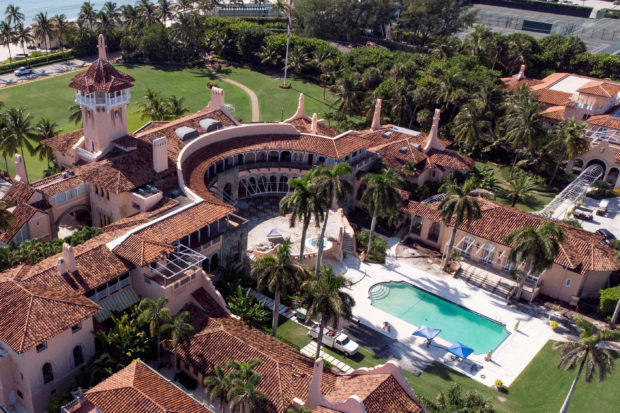Explainer: Can Trump claim executive privilege to shield Mar-a-Lago documents?

An aerial view of former U.S. President Donald Trump’s Mar-a-Lago home after Trump said that FBI agents searched it, in Palm Beach, Florida, U.S. August 15, 2022. REUTERS FILE PHOTO
A federal judge on Sunday granted former U.S. President Donald Trump’s request for a “special master” to review documents seized from his Mar-a-Lago resort, including to determine if some may be protected by executive privilege.
Below is an explainer on the scope of executive privilege and whether former presidents can claim it.
What is executive privilege?
Executive privilege is the legal principle that allows certain White House records to be shielded from lawmakers and the courts, in order for presidents to get candid advice on major decisions.
Trump repeatedly asserted the privilege as president in attempts to block records and testimony from Democrats’ congressional investigations, including in the first impeachment inquiry of his presidency. No court ruled on the merits of Trump’s executive privilege claims while he was in office.
Presidents can also waive the privilege, as President Joe Biden did in response to a request for White House records sought by the congressional committee investigating the Jan. 6, 2021, riots at the U.S. Capitol building by Trump supporters.
Article continues after this advertisementCan former presidents claim executive privilege?
U.S. courts have not definitively ruled on the extent to which former presidents can assert executive privilege. The U.S. Supreme Court last year side-stepped the question in Trump’s bid to block White House records from the Jan. 6 committee, leaving it a gray area in the law.
Article continues after this advertisementFormer President Richard Nixon attempted to claim the privilege to prevent White House records from being made public after his resignation. The Court in that case said Nixon could be heard on his privilege claims but ultimately rejected his attempt to shield the records, finding the sitting president is “in the best position” to make privilege determinations.
Trump’s lawyers sought a special master, or a court-appointed third party, to review documents seized from Mar-a-Lago by federal agents in August and to put aside any of Trump’s communications with his lawyers or materials covered by executive privilege. DOJ opposed the request, arguing the privilege does not apply.
To eventually win a court order shielding the records, Trump would first have to establish that he can assert the privilege even though he is no longer in office, said Heidi Kitrosser, a law professor at Northwestern University. She said the former president’s team has only a “very weak argument” to do so, noting the lack of clarity from the Supreme Court.
Trump would then have to overcome Biden’s position that executive privilege does not apply to the materials, and must show any harm from privilege violations outweighs the government’s need for the documents in its criminal probe into Trump’s possession of classified records, Kitrosser said.
Has a special master ever been appointed to weigh executive privilege?
Experts said they have never heard of a special master being appointed to decide if executive privilege applies to documents.
In the case over presidential records at Trump’s Mar-a-Lago resort, Biden deferred the decision on whether privilege applies to the National Archives and Records Administration. In a May letter to Trump’s private counsel, months before the raid, the national archivist said it “would not be viable” for Trump to assert executive privilege, as the records would only be viewed by other parts of the executive branch.
Allowing someone who is not in the executive branch to decide whether the privilege applies to records is unprecedented, experts said.
“Having an appointed third party decide between an incumbent’s and a former president’s claim violates the very constitutional basis of the privilege as a presidential power,” said Mark Rozell, dean of the Schar School of Policy and Government at George Mason University.
RELATED STORIES
Trump uses FBI search of his Mar-a-Lago home to solicit campaign donations
US judge says he leans toward releasing some evidence for Trump search